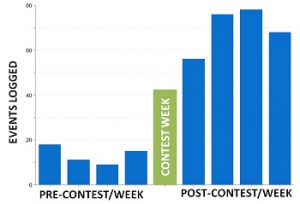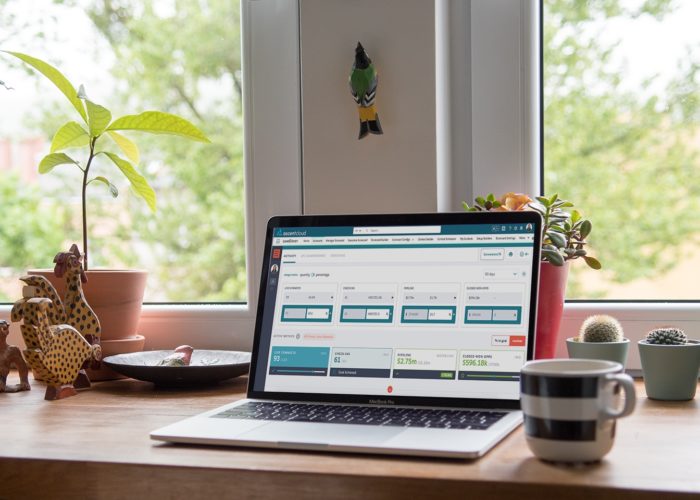I’ve been talking with marketers and sales managers for years about the concept of gamification, sales contests, and competitions and a common question is, “Will this drive a short lived spike in activity, or will it have a lasting impact on our business?” When it comes to the world of sales, many incentive competitions are focused on changing the way salespeople work day-to-day. People get set in their ways, and changing habits is hard – even if salespeople understand the value of making a change. This could include pitching a new product, using Salesforce.com in a certain way, or trying a new sales approach.
A highly effective way to provide that nudge is to run a sales contest or use gamification principles that offer a reward, incentive, leaderboards, and status updates. But, the question still remains – will that motivate the sales team during the contest just so they can win, or will it have a lasting impact? Following are three examples of this concept in action, along with some specific results.
Changing Habits of a Select Few
When ePrize began using Salesforce.com, the most significant change we asked of our sales team was to start logging call reports by using Event records. Writing brief call reports had never been asked of the sales team before, but the leadership team felt was important to manage the business and help salespeople better track client conversations (versus using notebooks, writing emails to themselves, or just trying to remember conversations). We were having a hard time getting some of the sales team members behind this, even though we knew that long term it would help the business, help them sell more, and improve client service.
 The first test was targeted to a small group of salespeople who were rarely logging Events. Across the group, they would log about 10/week which is nowhere near what was actually happening or expected. The team felt comfortable in their old ways and weren’t behind the change. So we ran a very simple one week sales competition where every Event logged would get a point. Whoever got the most points that week would get $100 gift certificate to a local restaurant for a nice dinner. A contest leaderboard and status updates would be shared daily to keep the team aware of where they stood.
The first test was targeted to a small group of salespeople who were rarely logging Events. Across the group, they would log about 10/week which is nowhere near what was actually happening or expected. The team felt comfortable in their old ways and weren’t behind the change. So we ran a very simple one week sales competition where every Event logged would get a point. Whoever got the most points that week would get $100 gift certificate to a local restaurant for a nice dinner. A contest leaderboard and status updates would be shared daily to keep the team aware of where they stood.
RESULTS: During that week, Events immediately shot up with over 40 Events logged. It drove many conversations between the reps and their manager about how to summarize client conversations effectively, what should count as an Event, etc. The team then started to see the value to having a central place for keeping their notes, allowing others to see those notes, and defining next steps. For the 4 weeks after the contest was over, Events per week by this group consistently held around 60.
Motivating a Larger Group
So it’s one thing with a small group of people who just weren’t logging any Events at all. It’s another thing to change the habits of a larger team, with a mix of low/medium/high adopters to logging their client meetings. This test ran across an entire region of about 25 salespeople. It worked in the same way – one point for every Event logged, and the winner would get $150 for a lunch/dinner with a couple of their peers.
RESULTS: For the 4 weeks prior to the contest, Events logged/week were consistently around 50. During the week of the contest, it shot up to 85. For the 4 weeks after the contest was over, Events logged/week held steady around 60 – a 10% increase from the pre-contest results.
Motivating a New Sales Approach
I was speaking with Koka Sexton, Director of Social Media Strategy at InsideView. InsideView is all about sales intelligence, so getting their reps to use social information to sell better helps them lead by example. Koka ran a sales competition to motivate sales reps to be more active in social media. “We would continually talk with our team about how using social media could help them sell better, particularly using Twitter and LinkedIn,” says Sexton.
“Our sales team understood the benefits in concept, but we were asking them to change their daily habits, which isn’t easy. So we ran a simple sales contest where we tracked social activity by salesperson. When we announced the competition, their social activity spiked immediately. The contest ran for about a month to keep them active. The best part was that when the contest was over, activity held strong. The contest was the nudge the sales people needed to try something new. Then once they did it, they started to appreciate the value, and the behavior continued well after the contest ended.”
Conclusion
Changing habits is hard, and sometimes people just need an extra push or motivation. A sales contest or competition helps by using rewards, and keeping the team engaged using leaderboards and ongoing status updates. It motivates the team to work and learn together.
The one caution I would share though is to not rely on the contest by itself, and a one-week contest is probably too short. I’ve heard that people need to do something for 30+ days to change a habit long term. The results will only sustain if the behavior you are trying to change will truly help your reps long term, they buy-in to the change, and you as a manager are continuing to encourage and support the team to keep at it. The competition is an effective and rewarding way to give it a kick start.



